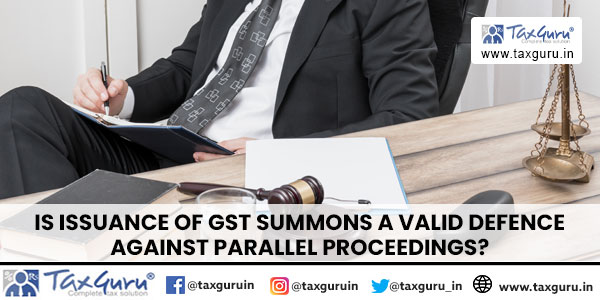Whether mere issuance of GST Summons constitutes a valid defence against parallel proceedings?
Introduction
To prevent multiple or parallel proceedings on the same subject matter, Section 6(2)(b) of the CGST/SGST Act (“Act”) was incorporated. However, despite its well-intended objective, this provision has frequently been a point of contention between taxpayers and tax authorities. A recurring issue arises when one authority (either the Central or State GST authority) initiates proceedings by issuing a summons to record statements, while, during the pendency of such proceedings, another authority (either Central or State) commences a separate proceeding, such as the issuance of a Show Cause Notice (SCN), against the same taxpayer.
The crux of the issue lies in the interpretation of the term “initiation of proceedings” and whether the mere issuance of a summons under Section 70 of the Act constitutes the initiation of proceedings for the purpose of invoking the bar under Section 6(2)(b). This issue is no longer res integra, and the judiciary has provided guidance on the matter through various High Court rulings. Some of these judgments are analysed below to understand judicial trends.

Judgement in G.K. Trading Company
A leading authority on this issue is the judgment in G.K. Trading Company vs. Union of India [Writ Tax No. 666 of 2020], wherein the Hon’ble Allahabad High Court examined the interplay between Section 6(2)(b) and Section 70 of the Act. High Court emphasized that the term “proceedings” as used in Section 6(2)(b) is qualified by the phrase “subject-matter” which indicate that the prohibition applies only to an adjudication process/proceeding on the same cause of action and for the same dispute, which may be proceedings relating to assessment, audit, demands and recovery and offences and penalties etc. Thus, it was held that the proper officer may invoke power under Section 70 in any inquiry, however the prohibition under Section 6(2)(b) shall come into play when any proceeding on the same subject-matter had already been initiated by the authority.
Madras High Court in Kuppan Gounder P.G. Natarajan vs. Directorate General
Hon’ble Madras High Court in Kuppan Gounder P.G. Natarajan vs. Directorate General of GST Intelligence, New Delhi 2022 (58) G. S. T. L. 292 (Mad.) reaffirmed that the scope of Section 6(2)(b) and Section 70 is different and distinct, as the former deals with any “proceedings on a subject matter/same subject matter” whereas, Section 70 deals with “power to summon in an inquiry” and therefore, the words “proceedings” and “inquiry” cannot be mixed up to read as if there is a bar for the respondent to invoke the power under Section 70 of the Act.
Similar Judicial Endorsements
The aforementioned view has been consistently upheld in recent judgments, including Rais Khan [2024 (3) TMI 1086 – Rajasthan High Court] and K.T. Saidalavi [2024 (10) TMI 1119 – Kerala High Court], both of which reiterated that the issuance of a summons under Section 70 does not constitute the initiation of proceedings for the purpose of Section 6(2)(b).
Our comments
A thorough analysis of the aforementioned judicial precedents indicates that the mere issuance of a summons under Section 70 of the Act cannot be deemed as the initiation of proceedings within the meaning of Section 6(2)(b). The jurisprudence establishes a clear distinction between an inquiry under Section 70 and the initiation of adjudicatory proceedings under Section 6(2)(b), ensuring that tax authorities retain the power to issue summonses without being constrained by the bar on parallel proceedings.
****
Author: CA Jignesh Kansara, Founder Partner | DAKSM & Co. LLP, Chartered Accountants





